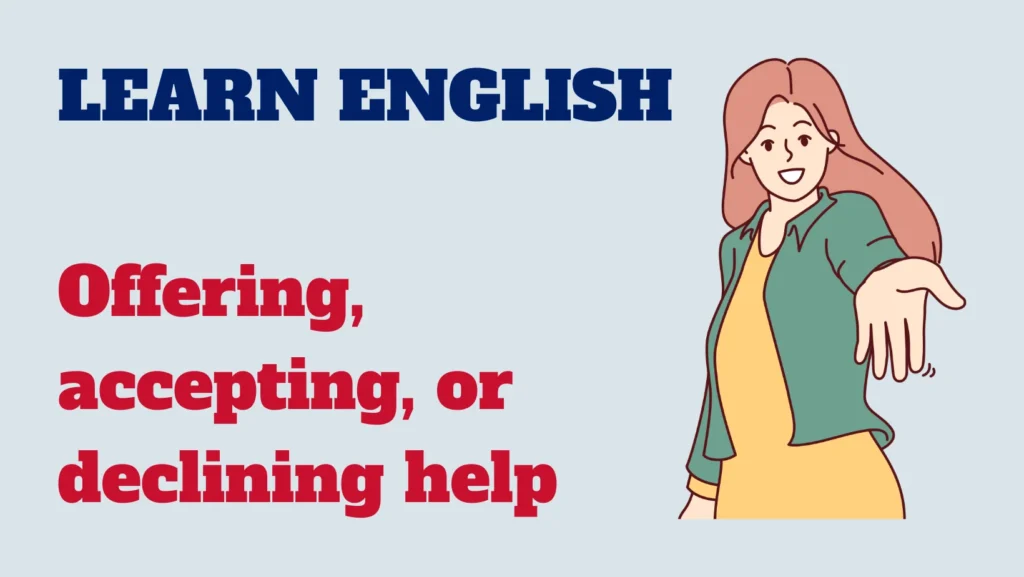When learning a new language, mastering common expressions is essential for effective and polite communication. In this lesson, we will explore different ways to offer, accept, and decline help in English.

Whether interacting with native speakers or other learners, these expressions will be valuable for creating positive and seamless interactions.
Basic expressions:
“Can I help you?“
A simple and direct way to offer assistance.
“Need any help?“
A short and friendly question to offer assistance.
Offering Assistance:
“If you need help, feel free to let me know.”
A polite way to offer support without being intrusive.
“I’d be happy to help you.“
A cordial statement showing your willingness to assist.
Informal expressions:
“Need a hand?“
A familiar phrase to offer help to a friend or someone close.
“I can give you a hand if you want.”
A casual way to make yourself available for help.
Proposing solutions:
“Maybe we could try…“
Introduces a suggestion to solve the person’s problem.
“Have you thought about…“
A question that prompts consideration of a potential solution.
Supportive expressions:
“Don’t worry; I’m here to help you.“
Reassures the person in distress and offers comfort.
“Together, we’ll find a solution.”
Emphasizes the idea of working as a team to solve the problem.
Formal expressions:
“I am at your disposal for any assistance you may need.”
Used in professional or formal contexts.
“If you require any assistance, please inform me.“
A courteous phrase offering help in a formal setting.
Offering Expertise:
“Given my experience in this field, I could help you with this.”
Offers assistance based on specific skills.
“Feel free to consult me if you have any questions about this.”
Indicates your availability to answer questions.
Other expressions:
Offering help:
Can I help you?
Need a hand?
Can I assist you with something?
I’m here if you need help.
If you need help, feel free to let me know.
I’d be happy to help you.
I offer my help for…
Accepting help:
Thank you; that’s very kind of you.
I appreciate it; that’s really helpful.
Your help would be greatly welcomed, thanks.
I’m grateful for your offer of help.
It would relieve me a lot, thank you.
Your gesture is truly generous, thanks.
I gladly accept your help.
Declining help:
Thank you, but I think I can manage.
That’s very kind of you, but I’ll be okay.
Thank you very much for your offer, but I’ll manage.
I appreciate your offer, but I prefer to do this alone.
I’m touched by your proposal, but I’ll decline.
I’d rather handle it on my own, thanks.
It’s kind of you, but I’ll take care of it.
Knowing how to offer help politely and appropriately is a crucial aspect of communication in English. Whether interacting with friends, colleagues, or strangers, these expressions will help you establish positive relationships and make your interactions more enjoyable. Don’t hesitate to use these expressions in your daily English practice as they will help you connect with others in a compassionate and effective manner.



